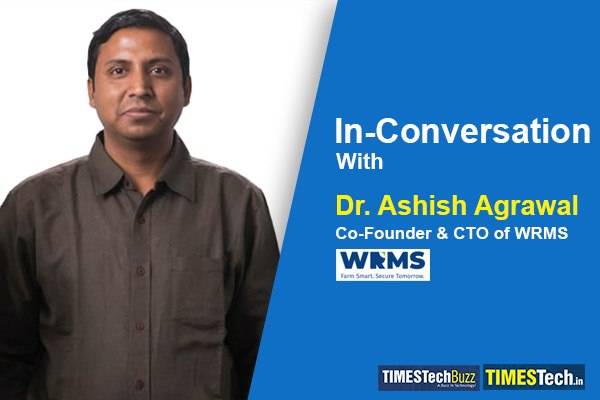In an exclusive interview with TimesTech, Dr. Ashish Agrawal, Co-Founder & CTO of WRMS, highlights the transformative role of IoT and AI in India’s agriculture sector. Discover how technology is driving sustainable farming practices and securing 1 million farms by 2026.
Read the full interview here:
TimesTech: How is technology, particularly IoT and AI, driving the agricultural revolution in India today?
Dr. Ashish: There is no industry niche that has not started to enjoy the benefits that IoT and AI have to offer. The agriculture sector is no exception. The combined use of these technologies in agriculture practices has revolutionized the industry in unimaginable ways, helping to bridge the gap between food demand and supply, which is one of the world’s most pressing problems.
Farmers must adopt new technologies to meet the growing need for food and to improve crop quality. In this regard, smart farming employs AI and IoT technologies to assist farmers in increasing production. Let’s understand how:
1. IoT and AI technologies ensure healthier crops by monitoring soil, temperature, humidity, and crop-specific growing conditions. Real-time updates through continuous observation ensure reduced crop wastage.
2. These new-age technologies help farmers collect data to relieve their workload and automate a wide range of agriculture-related tasks such as Irrigation Drones, Automatic Irrigation, and Automated Farm Machinery, etc.
3. Data-driven forecasts help improve agri-business returns and improve the functioning of the food supply chain.
4. IoT smart applications help control costs due to excessive utilization of resources like water and electricity. They can ensure timely irrigation and pest control from anywhere through connected devices and automatic systems.
5. AI product development, powered by ML, can help farmers analyze genetically modified seed information and precision sowing. In traditional agriculture, the use of fertilizer and pesticides is based on manual estimation.
6. Collecting data and analyzing it can help farmers mitigate farming risks. They can estimate demand and forecast sales. It will also help them streamline business processes better than done manually. They can remotely control the batch to be stored or sold. They can calculate total costs to work out a profitable selling price for each crop.
7. Real-time monitoring through IoT technology improves the agility of agricultural processes. Prediction systems allow farmers to prepare for changes in growing conditions. The health of crops is judged against the weather, humidity, and air quality. Proactive measures to save the crops against infestation and bad weather ensure less wastage.
TimesTech: Can you share examples of how IoT and AI are revolutionizing farming practices and boosting productivity?
Dr. Ashish: Weather Risk Management Services (WRMS) provided a significant boost to Mentha crop farmers in the Barabanki region of Uttar Pradesh (UP). These farmers faced a myriad of challenges, including nutrient deficiencies, unseasonal rainfall, and persistent pest issues. However, WRMS, a leader in smart and sustainable farming in India, introduced technological interventions and advanced decision support systems that revolutionized their agricultural practices.
WRMS implemented a comprehensive approach that resulted in remarkable improvements. Farmers experienced a 20% decrease in input costs and an 18% conservation of water resources, leading to enhanced returns on investment.
The crop advisory services offered by WRMS included various key components. First, through their SecuFarm Mobile Application, they distributed weekly farm activity recommendations to over 3000 farmers, ensuring timely and effective task execution. Nutrient management involved soil health data analysis and soil testing at the village level, helping identify nutrient deficiencies and recommending suitable soil treatments before crop sowing.
Plantation management was enhanced through satellite imagery services that detected low plant density on 3% of farms, allowing for timely notifications and suggestions for replantation. Effective irrigation management recommendations were provided to 72% of farmers, considering factors such as soil type, irrigation pattern, crop stage, and weather forecast.
Growth monitoring involved satellite-based detection of low NDVI levels in 8% of farms, prompting nutrient interventions that improved crop health. Pest and disease management benefited from weather forecasts and an AI-based rule engine, generating alerts for infestations in 82% of farms, enabling informed decision-making and reduced crop damage.
WRMS also monitored weather events, accurately predicting unseasonal rainfall during the harvesting period, allowing farmers to delay their activities and identify an appropriate harvesting window for better yields.
WRMS’s intervention showcased the immense potential of technological advancements and decision support systems in addressing agricultural challenges and promoting sustainable and profitable farming practices for Mentha crop farmers in the Barabanki region of Uttar Pradesh. This holistic approach resulted in significant positive outcomes, reducing costs, conserving resources, and ultimately improving the livelihoods of the farmers.
TimesTech: How is WRMS contributing to the growth of the Agriculture IoT market, and what sets your solutions apart?
Dr. Ashish: The agriculture industry is witnessing a major shift nowadays due to modern day technologies like IoT, AI, etc. The farming industry benefits from technological development, from planting and irrigation to crop health and harvesting. IoT solutions are focused on helping farmers close the supply-demand gap by ensuring high yields, profitability, and protection of the environment. The approach of using IoT technology to ensure optimum application of resources to achieve high crop yields and reduce operational costs is called precision agriculture. IoT in agriculture technologies comprises specialized equipment, wireless connectivity, software, and IT services.
WRMS is massively contributing to it as we are the manufacturer of low-cost agriculture IoTs. Ingen Technologies Private Limited, a fully owned subsidiary of WRMS, is a leading IoT manufacturer of automatic weather stations, automatic irrigation systems, pest traps, survey drones and soil moisture sensors. The company recently collaborated with Regional Meteorological Centre, Guwahati, Assam, India, Meteorological Department (IMD), and the Ministry of Earth Sciences (MoES), Government of India, and bagged the contract for procurement, installation, and maintenance of Automatic Rain Gauge Stations in the North East States of India. The company is working with many government organizations like Karnataka State Natural Disaster Monitoring Centre, Andhra Pradesh State Development Planning Society, and more.
Smart farming techniques by WRMS are supported by IoT technologies that enable growers and farmers to scale back waste and enhance productivity, starting from the amount of fertilizer utilized to the number of journeys the farm vehicles have made, enabling efficient utilization of resources like water, electricity, etc. IoT smart farming solutions may be a system that’s built for monitoring the crop field with the assistance of sensors (light, humidity, temperature, soil moisture, crop health, etc.) and automating the irrigation system. Farmers can monitor the sector’s conditions from anywhere. They can also select between manual and automatic options for taking the necessary actions to support this data. For example, if the soil moisture level decreases, the farmer can deploy sensors to start the irrigation. WRMS smart farming techniques are highly efficient when compared with the conventional approach.
TimesTech: Why is integrating risk management with technology so vital for addressing farmers’ challenges, and how does WRMS achieve this holistic approach?
Dr. Ashish: Farmers take risks every day and make decisions that have an impact on their business. The weather can change, prices at harvest time could decrease, hired labour might not be available during busy times, machinery and equipment could break down when most needed and government policy can change overnight. These risks have an impact on the farm’s profitability.
Farmers can control future risks and adapt to climate change with the aid of risk management techniques and technologies. The agro- sector and policymakers are both searching for strategies to make the sector more resilient to risks from weather, markets, and other shocks and to make it easier for it to adapt to climate change. Farmers are better equipped to deal with risks and uncertainties by developing resilience, which is the capacity to anticipate, prepare for, absorb, recover from, and adapt to bad occurrences. In fact, they may even gain from any new opportunities that these factors may present.
On this front, WRMS provides farmers with SecuFarm that de-risks farming and helps farmers achieve better yields and guaranteed income. We help farmers with our SecuFarm app from seed selection to sowing, crop management, pest control, weather advice, harvesting, and the post-harvest phase. The latest technology solution in the agricultural sector helps farmers with accurate real-time agricultural data collection. Farmers can also connect with our agri experts through our app for instant solutions for the health of their crops. We offer IoT based agriculture services like accurate & real-time weather forecasting using indigenous Automated Weather Stations to measure parameters like temperature, humidity, rainfall, wind speed, wind direction & solar radiation every second. Remote pest monitoring is done using electronic traps and image processing algorithms. We also help farmers plan smart irrigation using automatic irrigation switches which save their time, efforts and water. Thus, we offer holistic tech based agriculture solutions to our farmers which make farming risk-free, sustainable and profitable for them.
TimesTech: Could you outline the key strategies and tech solutions WRMS is using to reach its goal of securing 1 million farms by 2026?
Dr. Ashish: WRMS is on a mission to revolutionize the farming sector by allowing farmers to dive into the world of latest technology in the agri space without worrying about the risks involved as the company offers them 360 degree income protection .With its flagship platform SecuFarm, WRMS offers farm-level yield assurance to smallholder farmers and brings them on the path to sustainable farming. The app helps farmers achieve more productive and sustainable farming, thus uplifting their socio-economic status.
With the help of SecuFarm app, smallholders get secured incomes as the process involves land analysis and further classification of sustainable agriculture practices to adopt in order to enhance the produce quality with well calculated data analytics backed with high-end technologies. In case a farmer doesn’t get the expected and predicted produce result, he’s compensated as per the land area. Such a smart initiative ensures that smallholders have enough finance to support their livelihoods no matter the post harvest results.
SecuFarm leverages its multi-disciplinary capability across smart farming, modern data science, and insurance solutions. The idea is to drive smallholders towards digital farming practices.
WRMS is also an industry leader in Climate Outlook and Weather Forecasting Services and builds resilience against vagaries of weather. WRMS helps farmers foresee weather-based risks within a smaller time frame and adopt the right practices to mitigate the risk. We foresee & estimate long-term climate-related risks and identify the markets/geographies which have the least risk. WRMS identifies business models vulnerable to climate risk in a time horizon of the next 10 to 25 years.
Moreover, the company is seeking investments to expand WRMS SecuFarm to a million farmers in a 3–4 year timeframe. Our mission is to secure 1 million farms by the year 2026. We will continue to focus on technology implementation and risk management advisory services. Along with this, we will work towards enhancing the quality of our offering, which includes multidisciplinary capabilities spanning data analytics, technology, and finance, to address and resolve complex agrarian challenges. We are also seeking partnerships with like-minded organizations working with smallholder farmers and FPOs so that we can reach the deepest pockets of the country where a farmer is sowing a seed in the hope of a good yield.
TimesTech: Tell us about your innovative IoT solutions, like preventing milk adulteration, and their impact on the dairy industry’s sustainability.
Dr. Ashish: SecuLock, launched by Ingen Technologies, a fully owned subsidiary of WRMS, is a state-of-the-art indigenously manufactured smart e-lock developed for live monitoring and prevention of theft & pilferage, especially in milk tankers. Comes with a smart e-Lock system that includes an electronic door-locking device, central server, mobile application, and control devices. The pre-installed tracking device captures and transmits location data to a central server for en-route theft and pilferage prevention and monitoring. And the memory stores location data and locking/unlocking data. SecuLock is a revolutionary product that can also be leveraged by other industries like cargo, courier, and companies handling transport of bulk goods from one point to another with high chances of on-road theft and adulteration. SecuLock and all its components are not physically accessible and thus, can’t be tampered with. There are also light sensors installed on the device to detect if the lock was activated during the dispatch of the vehicle. The device can only be operated through OTP enabled login, thus, only a designated officer can access the lock. Also, our 24/7 call center services provide assistance in ensuring that all the important alerts are swiftly acted upon and real-time assimilation and dissemination of data is ensured. The working process of SecuLock is so advanced that there is no scope of adulteration or pilferage. The control room assigns vehicles and managers/users to the plant. These managers/users log in through their loginID in the app using OTP and send an unlock command for loading/unloading of materials in vehicles through the app. Hence, the state-of-the-art SecuLock eliminates the problem of adulteration and pilferage of the dairy products.















